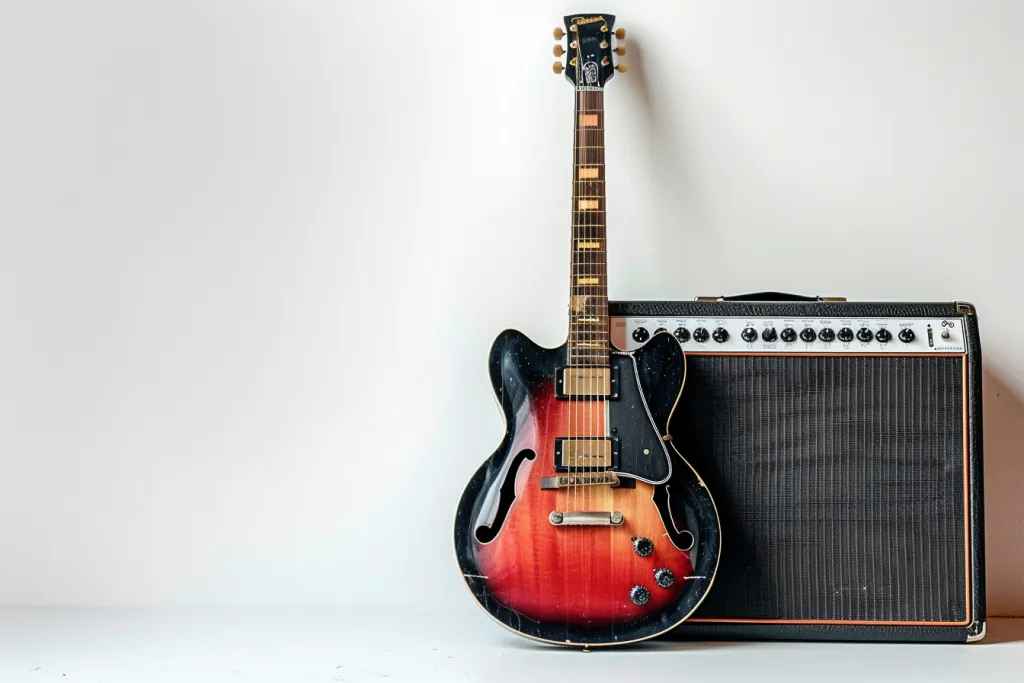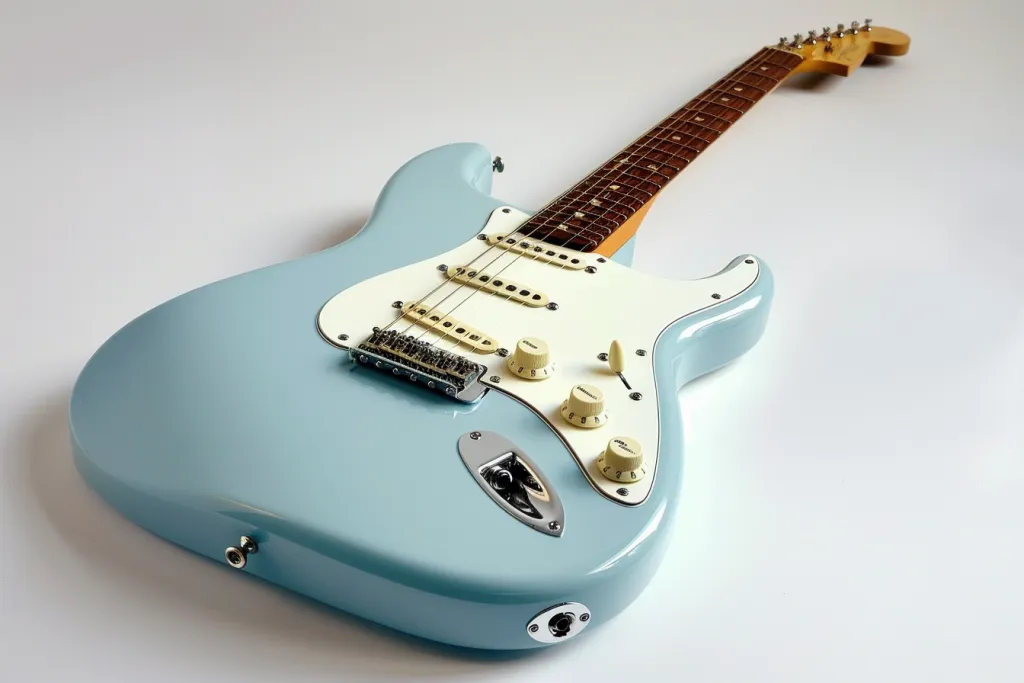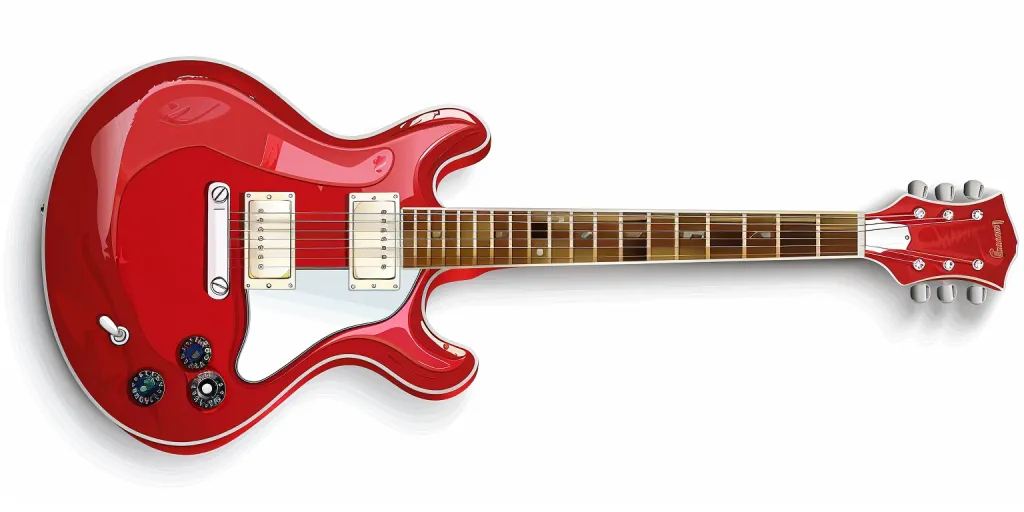The electric guitar stands as a symbol of musical innovation, bridging genres and generations with its distinctive sound. This guide explores the intricacies of the electric guitar, offering insights into its operation, benefits, drawbacks, and how to make it your own. Whether you’re a seasoned player or a curious newcomer, this article will illuminate the path to mastering this iconic instrument.
Table of Contents:
1. What is an electric guitar?
2. How does the electric guitar work?
3. Benefits and drawbacks of the electric guitar
4. How to choose an electric guitar
5. How to use an electric guitar
What is an electric guitar?

The electric guitar, a cornerstone of modern music, revolutionized the musical landscape upon its introduction. Unlike its acoustic counterpart, which relies on a hollow body to amplify sound, the electric guitar uses electronic pickups and an amplifier to project its sound. This instrument has become synonymous with a wide array of genres, from rock and jazz to metal and blues, showcasing its versatility and enduring appeal.
Electric guitars come in various shapes, sizes, and configurations, each offering a unique sound and playing experience. The body, neck, pickups, and strings all play critical roles in shaping the instrument’s tone and playability. Innovations in design and technology have expanded the electric guitar’s capabilities, allowing musicians to explore new sonic territories and express themselves in unprecedented ways.
At its core, the electric guitar is a tool for artistic expression, capable of producing a vast spectrum of sounds from gentle, clean tones to aggressive, distorted roars. Its design encourages creativity and experimentation, making it a favorite among musicians seeking to push the boundaries of music.
How does the electric guitar work?

Understanding the electric guitar’s operation requires a look at its key components: pickups, strings, and amplifiers. Pickups are the heart of the electric guitar, converting the vibration of the strings into electrical signals. These signals are then sent to an amplifier, which boosts them and projects the sound through speakers. The type and configuration of pickups greatly influence the guitar’s tone, offering a range of sonic possibilities.
The strings of an electric guitar also play a vital role in its sound. Made from metal, they interact with the pickups’ magnetic field, allowing their vibrations to be accurately captured and converted into an electric signal. The material, gauge, and tension of the strings can all affect the instrument’s tone and playability, providing players with further customization options.
Amplifiers not only increase the volume of the electric guitar but also shape its tone through various controls and circuitry. Players can adjust settings such as gain, bass, treble, and mid to fine-tune their sound. Additionally, effects units can be used in conjunction with the amplifier to add reverb, delay, distortion, and other sonic textures, further expanding the electric guitar’s expressive capabilities.
Benefits and drawbacks of the electric guitar

The electric guitar offers a plethora of advantages to musicians, including versatility, expressiveness, and the ability to easily integrate with technology. Its ability to produce a wide range of sounds makes it suitable for virtually any genre of music. The electric guitar’s design also facilitates playability, with features like thinner necks and lower string action aiding in comfort and speed.
However, the electric guitar is not without its drawbacks. Its reliance on amplification and electricity means it’s less portable and more dependent on additional equipment than an acoustic guitar. The complexity of its components, such as pickups and wiring, can also lead to maintenance and repair challenges. Additionally, the vast array of options and settings can be overwhelming for beginners, requiring a learning curve to fully exploit the instrument’s potential.
Despite these challenges, the electric guitar remains a popular choice for musicians around the world. Its benefits often outweigh the drawbacks, especially for those willing to invest time in mastering its intricacies.
How to choose an electric guitar

Choosing the right electric guitar is a personal journey that depends on several factors, including genre, playability, and budget. Beginners might opt for a simpler, more affordable model to start, while experienced players may seek specific features to match their playing style and sound preferences.
The body style of the electric guitar affects both its sound and ergonomics. Solid-body guitars are versatile and suitable for most genres, while hollow and semi-hollow bodies offer warmer tones ideal for jazz and blues. The choice of pickups is also crucial, with single-coils providing bright, clear tones and humbuckers offering richer, more powerful sounds.
Ultimately, the best way to choose an electric guitar is to try several models and see which one feels and sounds right. Pay attention to the neck’s shape and size, the guitar’s overall weight, and how comfortable it is to play. Trusting your instincts and focusing on what inspires you to play will lead you to the right instrument.
How to use an electric guitar

Mastering the electric guitar involves learning its components, understanding how to shape your sound, and developing your playing skills. Familiarizing yourself with the guitar’s controls, such as volume and tone knobs and pickup selectors, is essential for crafting your desired tone. Experimenting with amplifier settings and effects pedals can also unlock new sonic possibilities.
Practicing regularly is key to improving your technique and comfort with the instrument. Start with basic chords and scales, gradually incorporating more complex pieces and techniques as you progress. Listening to and learning from a wide range of players can also inspire and inform your approach to the electric guitar.
Remember, the electric guitar is an instrument of expression. Don’t be afraid to experiment and find your unique voice. With dedication and creativity, you can harness the electric guitar’s potential and make your musical mark.
Conclusion: The electric guitar is a versatile and expressive instrument that has shaped the sound of modern music. Understanding its workings, advantages, and how to choose and use one can enhance your musical journey. Whether you’re just starting out or looking to deepen your mastery, the electric guitar offers endless possibilities for creativity and expression. Embrace the journey, and let the electric guitar amplify your musical voice.




